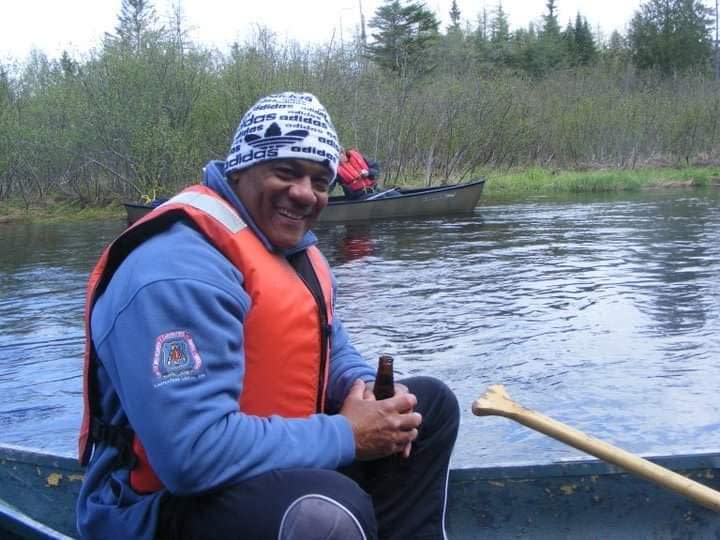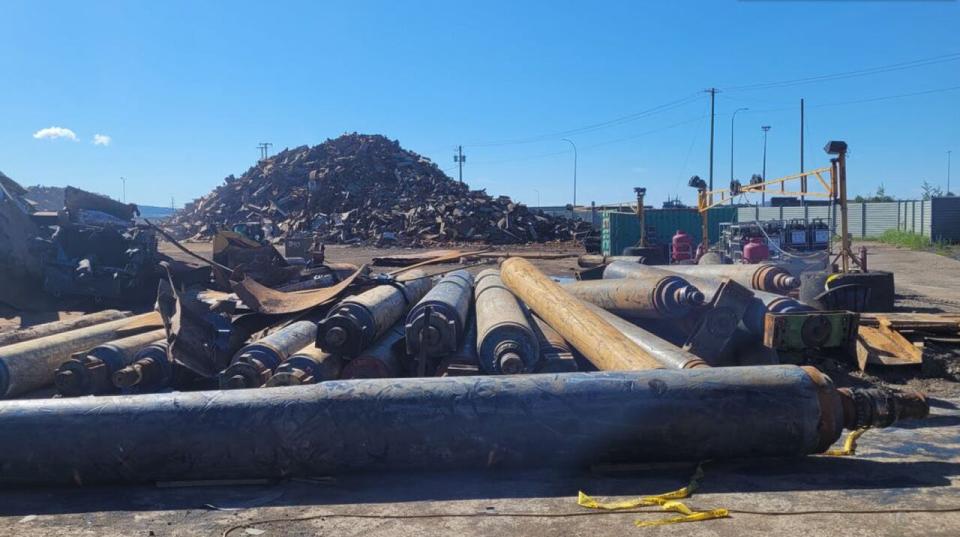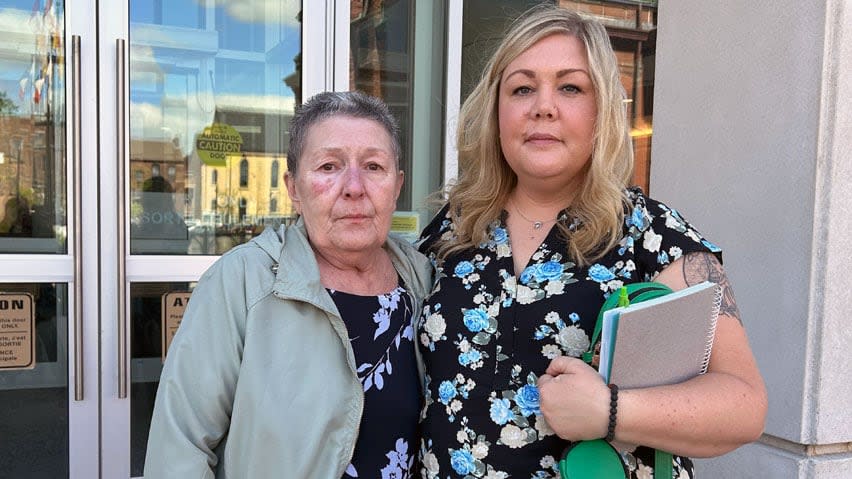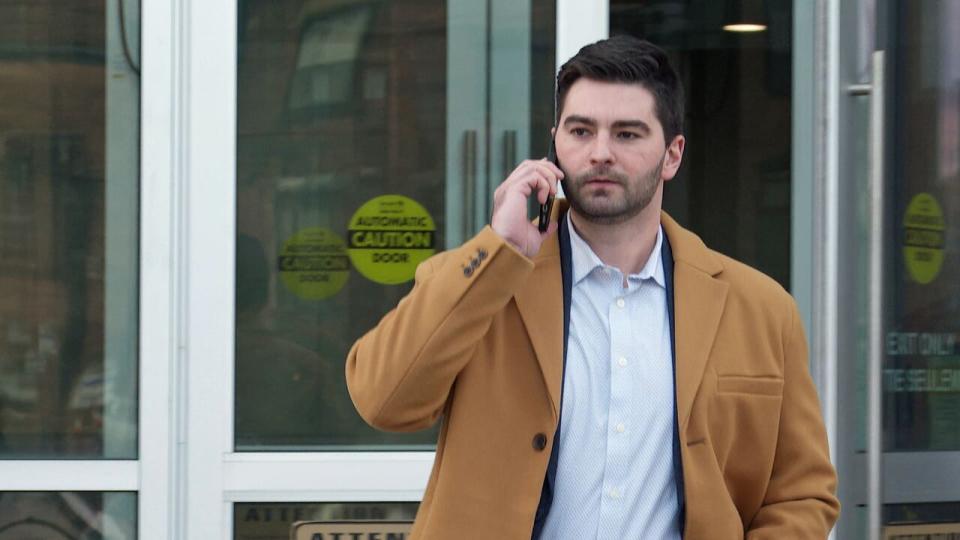Maine American Iron & Metal official warned Saint John of dangers of calender rolls, inquest hears

An American Iron & Metal official in Maine warned at least three Saint John employees about the dangers associated with pressurized calender rolls before Darrell Richards was fatally injured cutting into one with a circular saw, a coroner's inquest heard Tuesday.
Verne "Joe" Reynolds, the buyer for AIM in Oakland, who purchased the large metal cylinders used in paper production, told WorkSafeNB's manager of investigations Michel Cyr, that he disagreed with the company's decision to ship the rolls to the Saint John metal recycling facility.
"If it was up to me, I would have processed them here," he said in a 2022 audio statement played for the jury.
The rolls weigh more than 24,000 kilograms and are covered with cotton material held under 2,600 tonnes of pressure.
Reynolds, who has more than 20 years of experience dealing with the rolls, said he has seen them jump six inches off the ground when the energy is released. Debris can fly up to 50 feet in the air.
It's "hit and miss," he said. Sometimes the rolls just "pop open," but they can expand.
The Oakland facility had procedures in place to safely decommission them. These included either using an excavator shear to gradually "chew" away at the material and relieve the pressure, or using a torch to slowly burn the material.

The remaining calender rolls at American Iron & Metal's Saint John facility are stored under a blast mat until they can be safely decommissioned, the inquest heard Monday. (Michel Cyr/WorkSafeNB)
"It wasn't my call," said Reynolds. "I don't wanna get anybody in trouble, but somebody above me … said to ship them out to Saint John."
The Saint John facility is a larger yard, with more manpower and bigger equipment.
The calendar rolls arrived with no warning labels or information about how to decommission them, the jury heard. They sat at the west side waterfront facility for roughly three months before Richards, a contractor, was tasked with stripping the material from them on June 30, 2022.
The 60-year-old was sitting on one when he cut into it with a circular saw. The sudden release of energy severed his femoral artery and caused severe blood loss. The married father of three died in the hospital about 12 hours later.
Deputy chief coroner Michael Johnston and a jury are publicly hearing evidence from witnesses this week to determine the facts surrounding Richards's death.
The jury will also have the opportunity to make recommendations aimed at preventing deaths under similar circumstances.
I told Ryan [Cyr, the director operations] that, you know, there is a danger in these and how we do it over here. - Verne 'Joe' Reynolds, buyer for AIM Maine
Reynolds told the WorkSafeNB official he contacted AIM in Saint John about the calendar rolls before Richards was killed.
"I did reach out to Ryan [Cyr, the director of operations, by phone] and let them know about these rolls. … I'm not going to lie for anybody," he said.
"I reached out to Ryan, Adam Wallace [who was then-production supervisor] and Adam Hamilton and let them know about these rolls and how they need to be addressed.
"I told Ryan that, you know, there is a danger in these and how we do it over here."
Reynolds said he was "very upset" when heard about the fatal accident. "I did a lot of cussin'. I called them a few choice words, idiots."
Warning came a week after fatal accident
Wallace testified that Reynolds called him about a week after Richards's death to express condolences.
"At that point he expressed to me that he was aware that these [calender rolls] were dangerous.
"I said, 'I wish you would've told us this in advance.'"
Reynolds offered no response, he said.
It was Richards who suggested using a circular saw on the calender rolls, said Wallace. Richards indicated he had dealt with calendar rolls before and "had no concerns about it.
"His reaction was, "I can have these cleaned up within 48 hours."
Wallace, who is now operations manager, said he had no reason to question Richards's plan. He had a lot of experience, a "history of doing things the right way the first time," and was "very much safety conscious" — "the leader" to many, himself included, he said.
AIM rejected hazard identification program
Earlier in the day, Stephanie Spinney, AIM's health and safety adviser, said she helped develop a hazard identification program after Richards's death, but it was never implemented.
"It was too robust. [AIM] didn't want to do it," she said.
Crown prosecutor Chris Titus clarified, "So you wrote a policy to say, 'Hey, we need something to deal with that,' … but you submitted it to your superiors and they said, 'No, we're not doing that'?"
"Yes," Spinney replied, as members of Richards's family looked on from the front row of the Saint John courtroom, "because it was stated in a conversation that if they do hazard analysis on every piece of [scrap metal] that came in those gates we wouldn't have … a business."
WorkSafeNB identified 'gaps'
Spinney testified she worked on the hazard identification program with colleagues after WorkSafeNB officials conducted a "gap analysis" of AIM's west side metal recycling facility following Richards's death.
"My job was to work on this … safety plan, to get us up to speed on what was required," she said.
Support from above "was lacking" though, Spinney said, singling out Ryan Cyr, the director of operations.

Darrell Richards's widow Bessie Collins (left) and daughter-in-law Kelsey Bailey have been among the family members attending the inquest and submitting written questions for some witnesses to the two Crown prosecutors assisting the deputy chief coroner with the proceedings. (CBC)
There have been some safety improvements since Richards's death, however, she said.
For example, workers carry cards with them that identify hazards for particular jobs and steps to mitigate them.
The company has also hired additional health and safety officers for the region.
Hazards now identified before they arrive, says vp
Michael Cormier, AIM's vice-president of operations for Atlantic Canada and Maine, acknowledged there is no hazards-specific program in place.
Inspectors are, however, trained on what items the company doesn't want to receive, which would include hazardous items, he said.
Crown prosecutor Patrick Wilbur asked how robust the training is.
"It's certainly a lot more robust" than it was in 2022, replied Cormier.

Michael Cormier, AIM's vice-president for Atlantic Canada and Maine, said the company has restructured the reporting of incidents and accidents. When an investigation is completed, the company now sends a 'safety flash' to the entire organization. (Graham Thompson/CBC)
"What's even more important is how we identify the potential hazardous material prior to it entering the facilities."
AIM's scrap buyers are now also trained on rejectable materials, and will flag any issues, he said. An AIM operations and safety team will then go see the material in question, conduct a risk analysis and create a safe working procedure.
"Now more than ever, the buying process is more intertwined with operations and health and safety," said Cormier.
It's not a formal process yet, but "everyone's aware of it," and a draft policy is written, he said.
The inquest continues Wednesday at 9 a.m.


